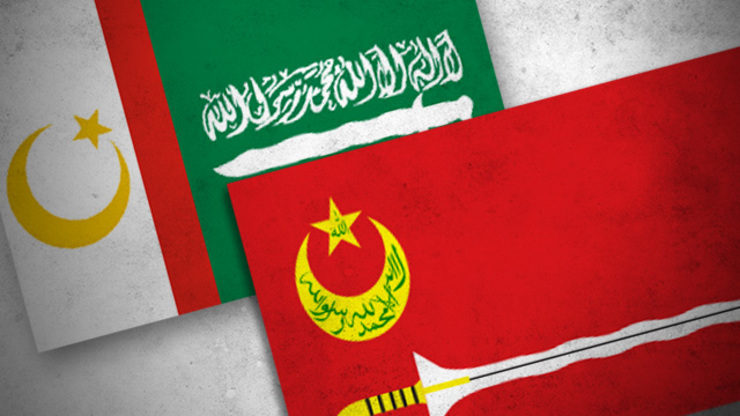 The hoopla over Digong Duterte’s stridulous announcement that he has finally decided to use his macho-ness to challenge Grace Poe for the presidency has also marginalized the story of the Moro Islamic Liberation Front’s effort to achieve peace and stability in Muslim Mindanao.
The hoopla over Digong Duterte’s stridulous announcement that he has finally decided to use his macho-ness to challenge Grace Poe for the presidency has also marginalized the story of the Moro Islamic Liberation Front’s effort to achieve peace and stability in Muslim Mindanao.
Understandably so, as the resolution of all the major issues affecting (and afflicting) the nation has been postponed until the next president assumes office. This means Congress is now on virtual recess (and its lazy habitués continued to be paid by our tax money), and the executive agencies whose heads have decided to quit the office to become candidates could not move forward, are ran by OICs who do not want to rock the boat. Even the public debate on issues is temporarily set aside: the continuing slow death of Metro Manila, the environmental problems caused by gold mining in northeastern Mindanao, the pursuit of the Abu Sayaff kidnap group in Basilan, and renewing pursuit of the Marcos billions now that a series of court decisions went against this parasite of a family’s favor.
Moreover, so does peace in Muslim Mindanao.
I nearly got inured to this circus until I chanced on an open letter by MILF spokesman Mohagher Iqbal just as I was starting to read Datu Michael O. Mastura’s new book Bangsamoro Quest: The Birth of the Moro Islamic Liberation Front.
Bangsamoro Quest was published in Malaysia in 2012, and there is no Philippine nor a Mindanao edition. This made me wonder if the respected Datu Mastura is more concerned about what his Malaysian readers would think of the book – but Malaysia has practically ceased giving military support to the Mindanao separatists! So why not write for Mindanawans and Filipinos?
If you are patient enough to plod through the 244 pages, you will gradually realize that embedded in the text’s grandiose incoherence are a few gems that include a decent comprehensive history of the MILF from its cadres’ perspective, as well as a glimpse of its prominent personalities. The last time we read about the organization and its leaders are in the snippets found in Tom McKenna’s excellent Muslim Rulers and Rebels (Anvil distributes the book) and Marites Vitug and Glenda Gloria’s singular Under the Crescent Sun (this book needs to be reprinted!).
This time, we have more information, thanks to a member of the MILF’s negotiating panel.

Mastura’s propensity to be verbose makes it hard to follow step-by-step the armed movement’s history. It is easier to read about the leadership because the author sets aside blocks of paragraphs about them.
Naturally, the first main actor whose life you want to know a bit is the MILF’s late founding chairman and “spiritual head” Salamat Hashim. His split from Misuari on religious grounds is well known, but that is all. Now we have Mastura to thank for for adding more information.
From earlier accounts, we learn that Ustadz Hashim and his allies broke away from Nur Misuari in 1977 to form the “New MNLF,” the MILF’s forerunner. Authors have speculated on the reasons for the split: that Salamat represented the Maguindanaoans who felt the MNLF was dominated by Misuari’s Tausog; that Salamat was unhappy about Misuari’s increasingly autocratic style of leadership and his hardline stance vis-à-vis the Marcos dictatorship; that Salamat’s patrons in the Organization of Islamic Conference, the Saudis and the Egyptians, were unhappy with the MNLF’s closeness to the Libyans; and Salamat’s worry over Misuari’s secularism and tightness with Filipino communists and socialists.
What Mastura’s book confirms include the following:
- Khadafy and Sadat hated each other, with the former calling Salamat “an agent of…Sadat." The rift worsened after Sadat signed a peace agreement with Israel
- Salamat’s split from Misuari arose from his suspicion that the MNLF leader’s political goal for the Bangsamoro was secular and Marxist, but worsened after Misuari seemed to have turned his back on Salamat after the latter “struggled hard…until the [MNLF] won recognition from the OIC as the ‘sole legitimate representative of the Moro people’ back in 1974"
What new information Mastura brings to the table is an answer as to why the MILF had repeatedly failed to convince the OIC to pass the mantle of “representative of the Moro people” from the MNLF to its rival. And this may just be the result of a simple mistake – Salamat arrived late.
According to Mastura: “The Arab League summit of early December [1977] in Tripoli proposed to ‘freeze’ (tajwid?) in protest against Sadat’s détente diplomacy; thus the rift between Sadat and the Steadfast states had its downside impact on the Polisario Front and the Eritrean front as with the Moro front, too. When Salamat failed to turn up at the Islamic Conference at Dakar in Senegal that year, Misuari regained its support!”
Interestingly, Mastura writes that the MILF was more open to negotiating with the Marcos dictatorship than the MNLF. He notes that the “Misuari loyalists argued that armed struggle was declared to be one route toward the liberation of the Muslim South, but not the only one. The Salamat-led Islamists were positioning themselves for a gradual approach without conceding any of the fundamental rights of the Muslims.”
Here then lies the possible reason why Salamat saw no problem writing to US President George W. Bush (remember that fellow who declared a War on Terror against Iraq?) to ask him to be one of the two mediators to speed up the peace talks between the MILF and the government. (More on this later.)
And it is also this pragmatism that probably explains why it took the MILF 21 years before it launched an all-out but defensive war against the government. Salamat was a good organizer, building the MILF army with care and quietly (suddenly in the late 1990s, there were Camp Busra in Sharif Aguak and Camp Abu Bakar), and continuously lobbying the OIC to change its mind.
And this is how we should see its negotiating position vis-à-vis the government today.
Salamat was thus an odd combination of the pragmatic and the naive, the militant and the moderate, the careful organizer and the failed supplicant – a fascinating fellow who wrote his dissertation, The Rise of Islam in Southeast Asia, in Egypt’s Al Anzhar University.
Unfortunately, he passed away too early. He would have probably made a good philosophy or theology professor after peace comes to Moro Mindanao, finally. – Rappler.com
Patricio N. Abinales is an OFW.